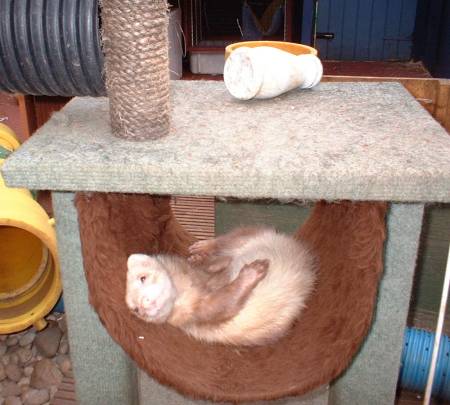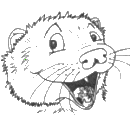Handling Ferrets
Ferrets should be handled gently but firmly. They soon learn that handling is fun and enjoy being cuddled and tickled behind the ears. Pick your ferret up behind his front legs and support his bottom in your other hand. Stroke him and talk to him softly. He will soon learn to trust you.
Like puppies and kittens, ferrets tend to 'test' things with their teeth. They are not vicious, but can make one or two experimental nips so until you have got to know your ferret and established mutual trust, do not allow him too near your face.
Although many ferret owners are pleased to demonstrate the trust and affection of their pets by allowing them to 'kiss' or lick their faces, this can only be attained after considerable handling and getting to know each other, so it not recommended for intitial introductions!
If your ferret nips fingers at first, try not to alarm him by quick movements or loud shouts. Take things slowly as you get to know him, especially if he is a rescue ferret. He may have had some rough treatment from uncaring owners in the past, and may take time to learn to trust people. Offer him titbits of food and stroke him gently while he eats. You may have to teach him that he need not be afraid of you. There are very few 'nasty' ferrets, only scared ferrets that have been subjected to harsh treatment. Time and patience is needed but this will be rewarded by an affectionate trusting pet.
Very young ferrets are hooligans, they think the world was made just for them to try their teeth out. Again this is not viciousness, only rough play. Just as puppies and kittens have to learn that biting is not acceptable, young ferrets (kits) have to be persuaded not to gaily chomp fingers. Play biting is different from fear biting and a light tap on the nose and a firm "No" is often all it takes to teach them that this is not acceptable play. Kits are often more prone to nip when hungry or when they expect to be fed, so a good tip is to feed them first and handle them when they are full-fed. As before, gentle handling makes gentle ferrets, and they soon grow out of their uncivilised ways.
Ferret Play
Ferrets are extremely playful. When excited they 'dance' sideways, twisting and jumping, their mouths open and making soft hissing sounds or 'chuckling'. Some even turn somersaults as they throw themselves around. Anyone who has watched otters play will recognise the same movements in ferrets, who, after all are close cousins to otters and share the ability to display the sheer love of life in their playfulness. Ferrets love to chase your feet, or jump at a piece of cloth dangled above them. Some like to chase objects that roll, such as balls or bottle tops. Others like to ambush each other (or you) from behind furniture.

They also enjoy running through tubes, rummaging around in boxes or bags and occasionally paddling in water. An old pillowcase makes an excellent plaything. It provides soemthing to climb in and ambush from. Suspended by all four corners it can be made into a hammock which many ferrets enjoy playing or sleeping in. Play is important to ferrets, so allow them lots of activity but make sure that anything you give them is not harmful. Claws can be caught in loose materials, and plastic carrier bags (which most ferrets love) are dangerous to unsupervised ferrets.

Many ferret owners take their ferrets for walks on small harnesses. This is much enjoyed by ferrets but you will need to be careful that he cannot wriggle out of his harness and escape. Although many ferrets learn to come when they are called, others quickly become lost and frightened. Again, a small name tag on his collar may help to ensure that an escaped ferret is recognised as a lost pet and returned to its owner.
Fun with your Ferret
Lots of game fairs have ferret shows and ferret racing, and this is a good place to meet other ferret owners, or maybe take your ferret to show him off.
Rescue ferrets, pet ferrets and working ferrets are all welcome. The common theme of these events is to promote ferret welfare and to educate the public that ferrets are not the evil, malodorous animals they are often made out to be.
You may want to join a ferret society. The National Ferret Welfare Society welcomes all ferret owners and has members attending many agricultural and country shows. Members receive regular newsletters and details of ferret shows and ferret events.
The Society is always happy to answer questions from ferret owners and to give guidance and advice on ferret care.
